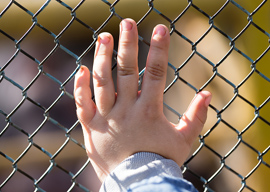
June 22, 2018

Source: Bigstock
Henderson Daniel finds this process “needless and cruel.” The trouble with such moralizing is that it’s not only ignorant of the law, it overlooks how difficult the illegal immigration problem is. As Rich Lowry noted in National Review, the government is “very constrained in how many family units it can accommodate. ICE has only about 3,000 family spaces in shelters. It is also limited in its overall space at the border, which is overwhelmed by the ongoing influx.” Still, it appears likely that our government, in its usual thankless generosity, will create a lot more shelters in order to keep these families together. To see just how very generous that is, consider that it’s roughly analogous to building a guest room to accommodate a man and his family—after he has broken into your home.
Certainly it is anxious and, in some cases, traumatic for children to be separated from their parents. Very undesirable, too, are the conditions from which some of these immigrants are fleeing. We should only expect that Henderson Daniel, like most of us, should feel sympathy for these persons. Yet none of this changes the fact that we cannot be a country without enforced borders and legal immigration. It is only too easy to criticize the policy without addressing the immigration problem in a substantive way and without recognizing the limit to what we can do for immigrants. Mere feeling, however well-intentioned, does not change the fact that the U.S. has limited resources and a limited amount of jobs, especially in vulnerable low-skill industries.
As I argued in my column “Immigration and the Tragic Sense of Life,” the immigration problem is essentially tragic, like life itself. We are torn between the need to put our own citizens first and pity for people who, for whatever reason, wish to leave their native countries to live here. These ends are not wholly compatible, so assigning primacy to the first (as we surely must do) requires that we do much less for needful immigrants—a category that numbers millions if not billions, potentially.
It is precisely because it is tragic that nobody wants to see the immigration problem for what it is. How much easier it is to take refuge in utopian delusion. How much easier it is to say with Charles Blow of The New York Times:
I can’t begin to imagine the incredible pain and anxiety parents…and their children must feel. I can’t imagine being forcibly separated from my children for any reason… This barbaric policy is an outgrowth of his own [Trump’s] personal cruelty. It’s absolutely reprehensible and an absolute reflection of him.
Blow, of course, is one voice among others in a chorus of indignation. None of Trump’s critics has shown any understanding of the tragic character of the immigration problem, for tragedy is something our progressive era will not allow.
Neither have the critics shown any appreciation for Trump’s efforts to restore law and order, although that is one of the major reasons he was elected. For being grounded in reality, the president is lambasted by those who, like petulant children, demand comforting lies. What he will never get from such persons is gratitude. There is a lesson here about human nature itself, and it is not a pretty one.
Comments on this article can be sent to the .(JavaScript must be enabled to view this email address) and must be accompanied by your full name, city and state. By sending us your comment you are agreeing to have it appear on Taki’s Magazine.